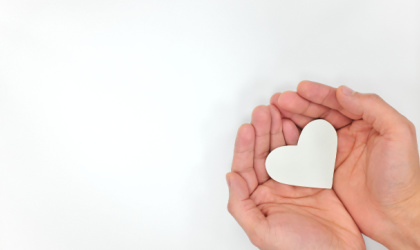
Against the backdrop of climate change, the cost-of-living crisis, global atrocities, and moral injustices, self-care feels more pressing than ever.
Self-care is like putting on your ‘own oxygen mask first’, so you have enough in the tank to support others, hold down a job, and be a good citizen of the world.
And yet, self-care can also feel like another thing to tick off the ever-growing to-do list. Perhaps, it’s even something that stresses you out. The likes of social media and #selfcare are probably to blame here.
But winning at serenity and peace isn’t the point. Self-care doesn’t have to be grandiose acts, like committing to a month-long silent retreat or sleeping on a bed of crystals. It can be simple, stripped back, and easy to weave into your daily life.
Here, we take a look at our favourite self-care acts that actually help you relax and unwind.
Get outside
Research suggests that spending at least 120 minutes a week in green spaces can lead to a greater sense of wellbeing (1).
Natural settings have the power to energise us, make us happier, relieve stress, connect us to others, and provide space to move our bodies and ‘switch off’, so find any excuse to spend more time alfresco.
Being outside also means supercharging your vitamin D3 levels, which is important for immunity, bone health, muscles, and overall wellbeing.
Breathe deeply
Stress and breathing have a bidirectional relationship: the more stressed you feel, the faster you’ll breathe. And the faster you breathe, the more stressed you feel.
Diaphragmatic breathing (‘belly breathing’) is a highly evidenced-based technique to support body and mind relaxation (2). Deep belly breathing activates the parasympathetic nervous system, which is responsible for the ‘rest and digest’ state.
Commonly known as ‘box breathing’, 4-4-4 breathing is one of the best ways to reduce stress. Spending a few minutes intentionally breathing will communicate messages of safety to your brain, even if you don’t feel it.
-
Breathe in through your nose for the count of four
-
Hold your breath for four seconds.
-
Exhale through your nose for the count of four
-
Hold your breath for four seconds
Repeat this practice for as long as you need. Even one minute has the power to transform your mood.
Embrace solitude
The hamster wheel of the modern world can be overwhelming at times, especially when everyone wants a piece of you. Many of us are constantly bombarded with work emails, group messages, and social commitments.
Taking a sliver of solitude each day can help buffer against this. Meditate, nap, listen to a podcast, water your plants – whatever it is, do it for you and you alone.
It can help you diarise your downtime, too. Put a block in your calendar for ‘me time’ each day and try to honour it.
Seek out positive social interaction
Sometimes, self-care can look like enjoying some much-needed solitude. At other times, however, it can look like spending time with people you love.
Humans are a hive species, after all. Our natural, evolutionary inclination to connect with people communicates to our body that we’re safe, reducing stress and improving overall wellbeing.
Call your best friend, go for a walk with your favourite colleague, or make dinner with your partner.
Hug someone you love
The importance of human touch is still woefully underappreciated. But it can work wonders for mental health and deserves pride of place in any self-care toolkit.
A 20-second hug can change your hormones, lower your blood pressure and heart rate, and improve mood – all of which are reflected in the post-hug increase in the social bonding hormone, oxytocin (3).
And if you can’t hug someone else, hug yourself. The act of wrapping your arms around yourself can help you feel safe, secure, and loved.
Laugh it out
Laughter is some of the best medicine going. In the words of Sophie Scott, neuroscientist, ‘laughter is an ancient evolutionary system that mammals have evolved to make and maintain social bonds, regulate emotions and make ourselves feel better’ (4).
Self-care can also look like watching a funny animal video, putting on some comedy, or getting nostalgic about a hilarious memory with your friends.
Journal
Journaling is an excellent medium to make space for your emotions and release negative thoughts.
Consider writing a stream of consciousness for 10-15 minutes first thing in the morning. Don’t think too hard about it. There’s no right or wrong way to journal. You don’t even need to write in full sentences. Just pen whatever comes to mind.
Move more
By now, most of us recognise the importance of movement for our health. Aside from supporting heart health, bones, and cognition, it’s also a tonic for mood.
Walking, running, dancing, cycling – whatever your go-to, any form of physical activity can help burn off stress and release feel-good hormones called endorphins.
If you want to unlock even more relaxation and inner peace, you may wish to try mind-body exercises, like yoga or Tai chi.
Enjoy a warm bath
A warm bath is a tried-and-tested self-care staple for a reason. As your body warms up, it encourages the blood to come to the surface, pulling heat away from your core. This lowers your body’s temperate and induces delicious feelings of relaxation.
Add your favourite essential oil blend, Epsom or Himalayan salts, and soak the stress away.
Try face yoga
‘Face yoga’ doesn’t only lift and strengthen your face, it can also release tension and boost blood flow. After applying your favourite facial oil or serum, create a hook with your forefingers and sweep across your jawline, cheekbones, and eyebrows in an upwards motion.
For an extra dollop of relaxation, why not add a few drops of lavender essential oil to a carrier oil, like grapeseed, and massage it onto your neck and collarbones? This indulgent ritual would be perfect before bed to prime you for sleep.
Fix yourself a cuppa
Sometimes, all you need is a cup of tea to invite in calming and positive energy. And if you’re after relaxation, we recommend choosing a herbal blend packed with botanical goodness, like Pukka Organic’s Chamomile Vanilla Manuka Tea or Peace Herbal Tea.
Use this moment to feel grounded and present. Sip mindfully and forget about the stresses of the day.
Get your supplements in order
Aside from lifestyle interventions, using the natural world to nourish your body and mind is another powerful act of self-love. Ashwagandha, magnesium, and theanine and lemon balm are often recommended to support the nervous system and would make great additions to any self-care arsenal.
Find out more
If you found this article on self-care and relaxation helpful, you can find similar guidance on Nutrition Buzz. Alternatively, please get in touch with our team of expert Nutrition Advisors, who are on hand to provide free, confidential advice via email, phone, and Live Chat.
References:
-
White, M.P., Alcock, I., Grellier, J. et al. Spending at least 120 minutes a week in nature is associated with good health and wellbeing. Sci Rep 9, 7730 (2019).
-
Zaccaro A, Piarulli A, Laurino M, Garbella E, Menicucci D, Neri B, Gemignani A. (2018) How Breath-Control Can Change Your Life: A Systematic Review on Psycho-Physiological Correlates of Slow Breathing. Front Hum Neurosci. 12:353.
-
Das, S. (2019) Hugging for 20 seconds a day may reduce your stress, The Times & The Sunday Times: breaking news & today’s latest headlines. Available online: https://www.thetimes.co.uk/article/hugging-for-20-seconds-a-day-may-reduce-your-stress-2zck2d7h6
-
No laughing matter: Sophie Scott (no date) RSB. Available online: https://thebiologist.rsb.org.uk/biologist-interviews/no-laughing-matter
Related Posts

Olivia
Olivia Salter has always been an avid health nut. After graduating from the University of Bristol, she began working for a nutritional consultancy where she discovered her passion for all things wellness-related. There, she executed much of the company’s content marketing strategy and found her niche in health writing, publishing articles in Women’s Health, Mind Body Green, Thrive and Psychologies.
View More



